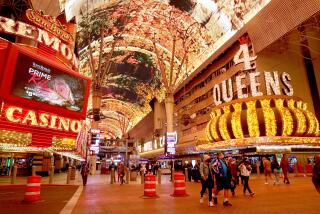Did Atlantic City’s Daring Gamble Make It a Pitiful Loser-by-the-Sea?
- Share via
ATLANTIC CITY, N.J. — Atlantic City was desperate.
The seaside resort town that boasted the nation’s first Boardwalk, the famed Steel Pier and diving horse, was decaying fast in the 1960s and 1970s. The number of visitors and jobs were plummeting.
“What we had was nothing,” said then-Gov. Brendan Byrne.
Nothing, that is, except the promise of gambling.
“Help Yourself. Help Atlantic City. Help New Jersey,” said a flyer urging state residents to approve casino gambling. “A yes vote . . . will help balance taxes, create jobs, boost the economy and cut down on street crime.”
Fifteen years after the first blackjack chip slid across the green felt at Resorts International, casino gambling instead has brought more crime, traffic and homelessness. It also brought the mob.
Behind the glass palaces that line the sea, scores of dilapidated houses are boarded up. Graffiti are spray-painted on crumbling wooden and steel structures. Empty concrete lots filled with broken glass and garbage are playgrounds for the city’s children, who don’t have a single city swimming pool for recreation.
And other states, including states in the region, are threatening to join Indian reservations as competitors for the gambling dollar.
“Fifteen years ago, Atlantic City was a hellhole. Today, it’s a hellhole with 12 casinos sucking away the money,” said Arnold Wexler, executive director of the Council on Compulsive Gambling of New Jersey.
The casinos have had their ups and downs, but the ups are apparent: In 1992, casinos reaped more than $3 billion from gamblers, and their properties were valued at about $4 billion, said city tax assessor W. Douglas Stewart.
The gaming halls carry about 65% of the city’s tax burden and last year paid a total of $98 million in property taxes alone, he said. More than 45,000 workers are employed in the industry and more than 31 million people visit Atlantic City each year.
“We resuscitated Atlantic City from the dead,” said Thomas Carver, executive director of the Casino Assn. of New Jersey. “We did not rebuild Atlantic City because that was not our job.
For most of the decade, Atlantic City was engulfed in political corruption. Two mayors--Michael Matthews and James Usry--were charged with taking cash under the table after separate undercover probes.
There are efforts afoot to use casino revenue to transform Atlantic City with a new, $250-million convention center, an expanded airport and a $450-million face lift for the city at large.
But these measures alone will not solve Atlantic City’s problems:
* Between 1973 and 1976, the city averaged 4,700 major crimes a year, including rape, burglary, murder and armed robbery, said Police Chief Nicholas Rifice. In 1990, there were 14,416 crimes. Two-thirds of those occurred in the casinos.
* Atlantic City’s population dropped from about 40,100 in 1980 to 38,000 in 1990. Each night, said Barry Durman, president of the Atlantic City Rescue Mission, there are 800 to 900 homeless people on its streets. Other cities of similar size might have 30 to 40 homeless people, he said.
* City officials say gambling also has slammed the city’s infrastructure.
The bottom line: “It still looks like South Bronx-by-the-sea,” said James W. Hughes, associate dean at the School of Planning and Public Policy at Rutgers University and author of “The Atlantic City Gamble,” which studied the casinos’ impact on the city.
“I wouldn’t say it has failed,” says Steven Perskie, who chairs the Casino Control Commission, the state board that regulates the city’s casinos. “I say it hasn’t succeeded yet, and there is a big difference.”
More to Read
Sign up for Essential California
The most important California stories and recommendations in your inbox every morning.
You may occasionally receive promotional content from the Los Angeles Times.













